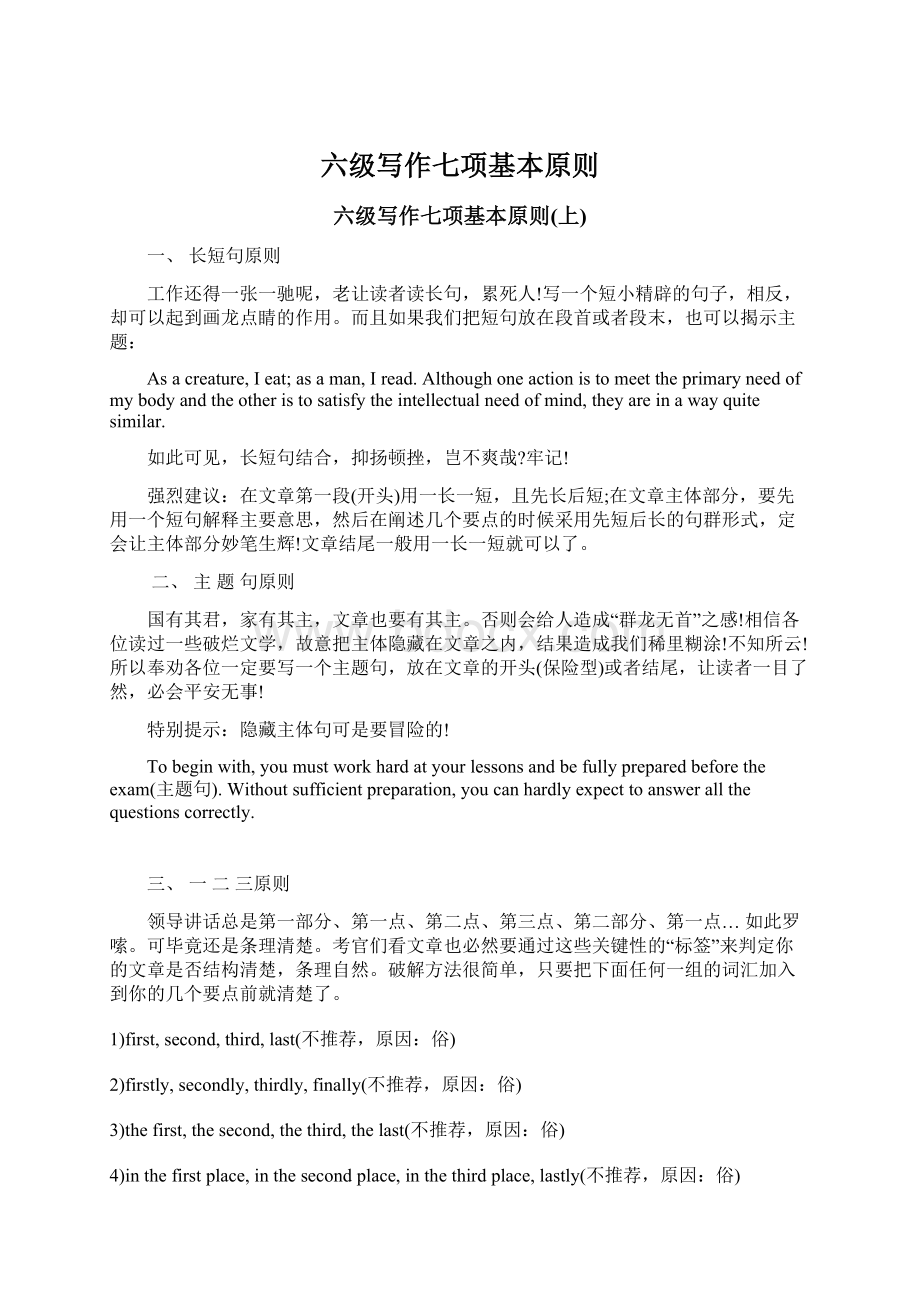六级写作七项基本原则.docx
《六级写作七项基本原则.docx》由会员分享,可在线阅读,更多相关《六级写作七项基本原则.docx(16页珍藏版)》请在冰豆网上搜索。

六级写作七项基本原则
六级写作七项基本原则(上)
一、长短句原则
工作还得一张一驰呢,老让读者读长句,累死人!
写一个短小精辟的句子,相反,却可以起到画龙点睛的作用。
而且如果我们把短句放在段首或者段末,也可以揭示主题:
Asacreature,Ieat;asaman,Iread.Althoughoneactionistomeettheprimaryneedofmybodyandtheotheristosatisfytheintellectualneedofmind,theyareinawayquitesimilar.
如此可见,长短句结合,抑扬顿挫,岂不爽哉?
牢记!
强烈建议:
在文章第一段(开头)用一长一短,且先长后短;在文章主体部分,要先用一个短句解释主要意思,然后在阐述几个要点的时候采用先短后长的句群形式,定会让主体部分妙笔生辉!
文章结尾一般用一长一短就可以了。
二、主题句原则
国有其君,家有其主,文章也要有其主。
否则会给人造成“群龙无首”之感!
相信各位读过一些破烂文学,故意把主体隐藏在文章之内,结果造成我们稀里糊涂!
不知所云!
所以奉劝各位一定要写一个主题句,放在文章的开头(保险型)或者结尾,让读者一目了然,必会平安无事!
特别提示:
隐藏主体句可是要冒险的!
Tobeginwith,youmustworkhardatyourlessonsandbefullypreparedbeforetheexam(主题句).Withoutsufficientpreparation,youcanhardlyexpecttoanswerallthequestionscorrectly.
三、一二三原则
领导讲话总是第一部分、第一点、第二点、第三点、第二部分、第一点…如此罗嗦。
可毕竟还是条理清楚。
考官们看文章也必然要通过这些关键性的“标签”来判定你的文章是否结构清楚,条理自然。
破解方法很简单,只要把下面任何一组的词汇加入到你的几个要点前就清楚了。
1)first,second,third,last(不推荐,原因:
俗)
2)firstly,secondly,thirdly,finally(不推荐,原因:
俗)
3)thefirst,thesecond,thethird,thelast(不推荐,原因:
俗)
4)inthefirstplace,inthesecondplace,inthethirdplace,lastly(不推荐,原因:
俗)
5)tobeginwith,then,furthermore,finally(强烈推荐)
6)tostartwith,next,inaddition,finally(强烈推荐)
7)firstandforemost,besides,lastbutnotleast(强烈推荐)
8)mostimportantofall,moreover,finally
9)ontheonehand,ontheotherhand(适用于两点的情况)
10)foronething,foranotherthing(适用于两点的情况)
建议:
不仅仅在写作中注意,平时说话的时候也应该条理清楚!
四、短语优先原则
写作时,尤其是在考试时,如果使用短语,有两个好处:
其一、用短语会使文章增加亮点,如果老师们看到你的文章太简单,看不到一个自己不认识的短语,必然会看你低一等。
相反,如果发现亮点—精彩的短语,那么你的文章定会得高分了。
其二、关键时刻思维短路,只有凑字数,怎么办?
用短语是一个办法!
比如:
Icannotbearit.
可以用短语表达:
Icannotputupwithit.
Iwantit.
可以用短语表达:
Iamlookingforwardtoit.
这样字数明显增加,表达也更准确。
五、多实少虚原则
原因很简单,写文章还是应该写一些实际的东西,不要空话连篇。
这就要求一定要多用实词,少用虚词。
我这里所说的虚词就是指那些比较大的词。
比如我们说一个很好的时候,不应该之说nice这样空洞的词,应该使用一些诸如generous,humorous,interesting,smart,gentle,warm-hearted,hospital之类的形象词。
再比如:
走出房间,general的词是:
walkoutoftheroom
但是小偷走出房间应该说:
slipoutoftheroom
小姐走出房间应该说:
sailoutoftheroom
小孩走出房间应该说:
danceoutoftheroom
老人走出房间应该说:
staggeroutoftheroom
所以多用实词,少用虚词,文章将会大放异彩!
六、多变句式原则
1)加法(串联)
都希望写下很长的句子,像个老外似的,可就是怕写错,怎么办,最保险的写长句的方法就是这些,可以在任何句子之间加and,但最好是前后的句子又先后关系或者并列关系。
比如说:
Ienjoymusicandheisfondofplayingguitar.
如果是二者并列的,我们可以用一个超级句式:
Notonlythefurcoatissoft,butitisalsowarm.
其它的短语可以用:
besides,furthermore,likewise,moreover
2)转折(拐弯抹角)
批评某人缺点的时候,我们总习惯先拐弯抹角说说他的优点,然后转入正题,再说缺点,这种方式虽然阴险了点,可毕竟还比较容易让人接受。
所以呢,我们说话的时候,只要在要点之前先来点废话,注意二者之间用个专这次就够了。
Thecarwasquiteold,yetitwasinexcellentcondition.
Thecoatwasthin,butitwaswarm.
更多的短语:
despitethat,still,however,nevertheless,inspiteof,despite,notwithstanding
3)因果(so,so,so)
昨天在街上我看到了一个女孩,然后我主动搭讪,然后我们去咖啡厅,然后我们认识了,然后我们成为了朋友…可见,讲故事的时候我们总要追求先后顺序,先什么,后什么,所以然后这个词就变得很常见了。
其实这个词表示的是先后或因果关系!
Thesnowbegantofall,sowewenthome.
更多短语:
then,therefore,consequently,accordingly,hence,asaresult,forthisreason,sothat
4)失衡句(头重脚轻,或者头轻脚重)
有些人脑袋大,身体小,或者有些人脑袋小,身体大,虽然我们不希望长成这个样子,可如果真的是这样了,也就必然会吸引别人的注意力。
文章中如果出现这样的句子,就更会让考官看到你的句子与众不同。
其实就是主语从句,表语从句,宾语从句的变形。
举例:
ThisiswhatIcando.
Whetherhecangowithusornotisnotsure.
同样主语、宾语、表语可以改成如下的复杂成分:
Whentogo,Whyhegoesaway…
5)附加(多此一举)
如果有了老婆,总会遇到这样的情况,当你再讲某个人的时候,她会插一句说,我昨天见过他;或者说,就是某某某,如果把老婆的话插入到我们的话里面,那就是定语从句和同位语从句或者是插入语。
Themanwhomyoumetyesterdayisafriendofmine.
Idon’tenjoythatbookyouarereading.
Mrliu,ouroralEnglishteacher,iseasy-going.
其实很简单,同位语--要解释的东西删除后不影响整个句子的构成;定语从句—借用之前的关键词并且用其重新组成一个句子插入其中,但是whomorthat关键词必须要紧跟在先行词之前。
6)排比(排山倒海句)
文学作品中最吸引人的地方莫过于此,如果非要让你的文章更加精彩的话,那么我希望你引用一个个的排比句,一个个得对偶句,一个个的不定式,一个个地词,一个个的短语,如此表达将会使文章有排山倒海之势!
Whetheryourtastesaremodernortraditional,sophisticatedorsimple,thereisplentyinLondonforyou.
Nowadays,energycanbeobtainedthroughvarioussourcessuchasoil,coal,naturalgas,solarheat,thewindandoceantides.
Wehavegottostudyhard,toenlargeourscopeofknowledge,torealizeourpotentialsandtopayforourlife.(气势恢宏)
要想写出如此气势恢宏的句子非用排比不可!
七、挑战极限原则
既然十挑战极限,必然是比较难的,但是并非不可攀!
原理:
在学生的文章中,很少发现诸如独立主格的句子,其实也很简单,只要花上5分钟的时间看看就可以领会,它就是分词的一种特殊形式,分词要求主语一致,而独立主格则不然。
比如:
Theweatherbeingfine,alargenumberofpeoplewenttoclimbtheWesternHills.
Africaisthesecondlargestcontinent,itssizebeingaboutthreetimesthatofChina.
开头万能公式:
1.开头万能公式一:
名人名言
经典句型:
Aproberbsays,“Youareonlyyoungonce.”(适用于已记住的名言)
Itgoeswithoutsayingthatwecannotbeyoungforever.(适用于自编名言)
更多经典句型:
Aseveryoneknows,Noonecandenythat…
2.开头万能公式二:
数字统计
原理:
要想更有说服力,就应该用实际的数字来说明。
Accordingtoarecentsurvey,about78.9%ofthecollegestudentswantedtofurthertheirstudyaftertheirgraduation.
更多句型:
Arecentstatisticsshowsthat…
结尾万能公式:
1.结尾万能公式一:
结论
Obviously(此为过渡短语),wecandrawtheconclusionthatgoodmannersarisefrompolitenessandrespectforothers.
更多过渡短语:
tosumup,inconclusion,inbrief,onaccountofthis,thus
更多句型:
Thus,itcanbeconcludedthat…,Therefore,wecanfindthat…
2.结尾万能公式二:
建议
Obviously,itishightimethatwetooksomemeasurestosolvetheproblem.
更多句型:
Accordingly,Irecommendthatsomemeasuresbetaken.
Consequently,tosolvetheproblem,somemeasuresshouldbetaken.
英语四六级考试写作句型常用100句
Youcanneverhavetoomuchsky.Youcanfallasleepandwakeupdrunkonsky,andskycankeepyousafewhenyouaresad.Herethereistoomuchsadnessandnotenoughsky.Butterfliestooarefewandsoareflowersandmostthingsthatarebeautiful.Still,wetakewhatwecangetandmakethebestof。
你永远不能拥有太多的天空。
你可以在天空下睡去,醒来又沉醉。
在你忧伤的时候,天空会给你安慰。
可是忧伤太多,天空不够,蝴蝶不够,花儿也不够。
大多美好的东西都不够。
于是,我们去我们所能,好好的享用。
——《芒果街上的小屋》
ITisatruthuniversallyacknowledged,that(asinglemaninpossessionofagoodfortunemustbeinwantofawife.)这是一条举世皆知的真理,那就是...(套进去^^)——《傲慢与偏见》
Thereisnoroyalroadto(science.)......路上无坦途。
——马克思。
有的时候一个很好的单词作用也是非常强大的哦~可以替换以下哈~这些都是传说中的bigwords~
1.important=crucial(extremelyimportant),significant(amountoreffectlargeenoughtobeimportant)
mon=universal,ubiquitous(ifsomethingisubiquitous,itseemstobeeverywhere)
3.abundant=ample(enoughandusuallyextra),plentiful(enoughforpeople'sneedsandwants)1
4.stick=adhere,cling(holdonsomethingtightly)
5.neglect=ignore.(difference:
neglectmeanssomeonehasnotpaidenoughattentiontosomething;ignoremeansnoattention.)
6.near=adjacent(twothingsnexttoeachother),adjoin(thesameasadjacent)
7.pursue=woo(manwooswoman,old-fashioned),seek(ifyouseeksth,youtrytoobtainit.FORMAL)
8.accurate=precise(preciseisexactandaccurateinalldetails),exact(correctineverydetail)
9.vague=obscure(unknownorknownbyonlyafewpeople)
10.top=peak,summit
petitor=rival,opponent(especiallyinsportsandpolitics)1
12.blame=condemn(ifyoucondemnsomething,yousayitisverybadandunacceptable)
13.opinon=perspective,standpoint(meanslookingataneventorsituationinaparticularway)
14.fame=prestige(describethosewhoareadmired),reputation
15.build=erect(youcanerectsomethingasbuildings,FORMAL),establish
16.insult=humiliate(dosomethingorsaysomethingwhichmakespeoplefeelashamedorstupid)
plain=grumble(complainsomethinginabad-temperedway)
18.primary=radical(veryimportantandgreatindegree),fundamental
19.relieve=alleviate(alleviatemeansyoumakepainorsufferingslessintenseorsevere)
20.force=coercesinto(coercemeansyoumakesomeonedosomethings/hedoesnotwantto),compel
21.enlarge=magnify(magnifymeansmakesomethinglargerthanitreallyis)
plex=intricate(ifsomethingisintricate,itoftenhasmanysmallpartsanddetails)
23.Lonely=solitary(ifsomeoneissolitary,thereisnoonenearhim/her
24.small=minuscule(verysmall),minute
25.praise=extol(strongerthanpraise),compliment(politeandpolitical)
26.hard-working=assiduous(someonewhoisassiduousworkshardordoesthingsverythoroughly
27.difficult=arduous(ifsomethingisarduous,itisdifficultandtiring,andinvolvesalotofefforts)
28.poor(soil)=barren,infertile(usedtodescribethesoilissopoorthatplantscannotbeplantedonit)
29.fragile=brittle,vulnerable(someonewhoisvulnerableiseasilyhurtemotionallyorphysically)
30.show=demonstrate(todemonstrateafactmeanstpmakeitcleartopeople.)
31.big=massive(largeinsize,quantity,orextent),colossal(usethisword,youemphasizesomething’slarge),tremendous(INFORMAL)
32.avoid=shun(ifsomeoneshunssomething,s/hedeliberatelyavoidthatsomethingorkeepawayfromit.)
33.fair=impartial(someonewhoisimpartialisabletogiveafairopinionordecisiononsomething.)
34.attack=assault(physicallyattacksomeone),assail(attackviolently
35.dislike=abhor(abhormeansyouhatesomethingtoaextremeextentformoralreasons),loathe(dislikeverymuch)!
36.ruin=devastate(itmeansdamagesomethingverybadly,orutterlydestroyit.)
39.always=invariably(thesameasalways,butbetterthanalways)
40.forever=perpetual(aperpetualstateneverchanges),immutable(somethingimmutablewillneverchangeorbechanged)
41.surprise=startle(itmeanssurpriseyouslightly),astound(surpriseyoutoalargedegree),astonish(thesameasastound)
42.enthusiasm=zeal(agreatenthusiasm),fervency(sincereandenthusiasm)
43.quiet=tranquil(calmandpeaceful),serene(calmandquiet)
44.expensive=exorbitant(itmeanstooexpensivethatitshouldbe)
45.luxurious=lavish(impressiveandveryexpensive),sumptuous(grandandveryexpensive
46.boring=tedious(ifyoudescribesomethingtedious,youmeanitisboringandfrustrating)
47.respect=esteem(ifyouesteemsomeone,yourespectandadmirehim/her.FORMAL)
48.worry=fret(ifyoufretaboutsomething,youworryaboutit)
49.cold=chilly(unpleas